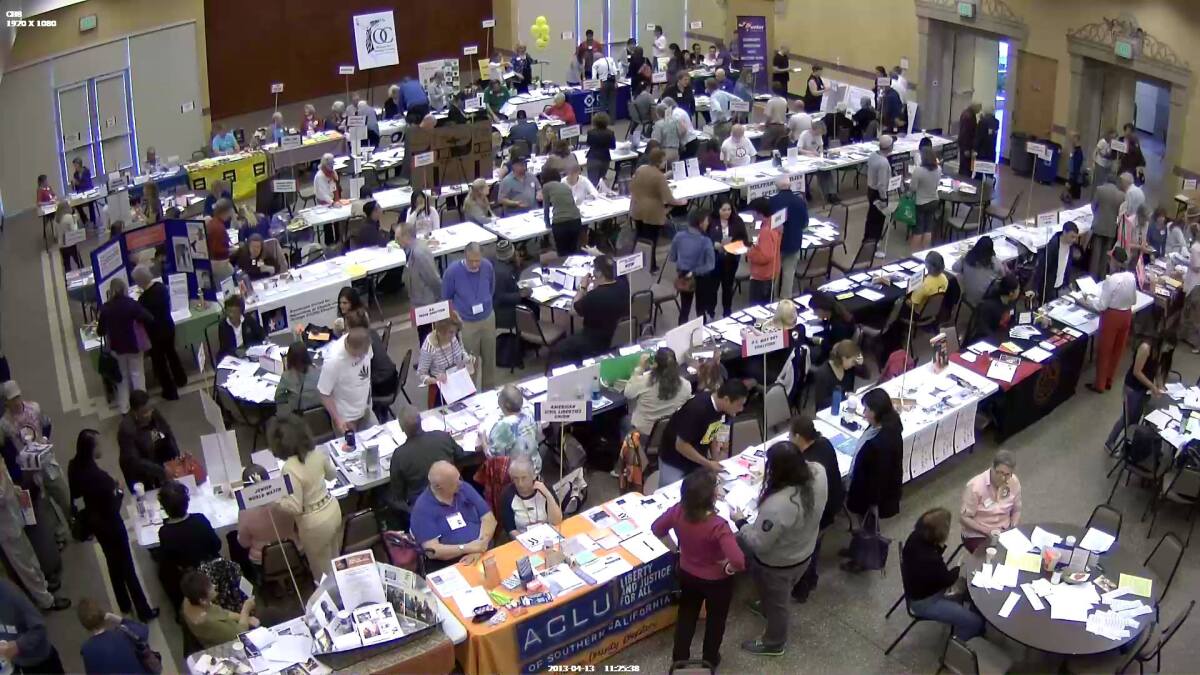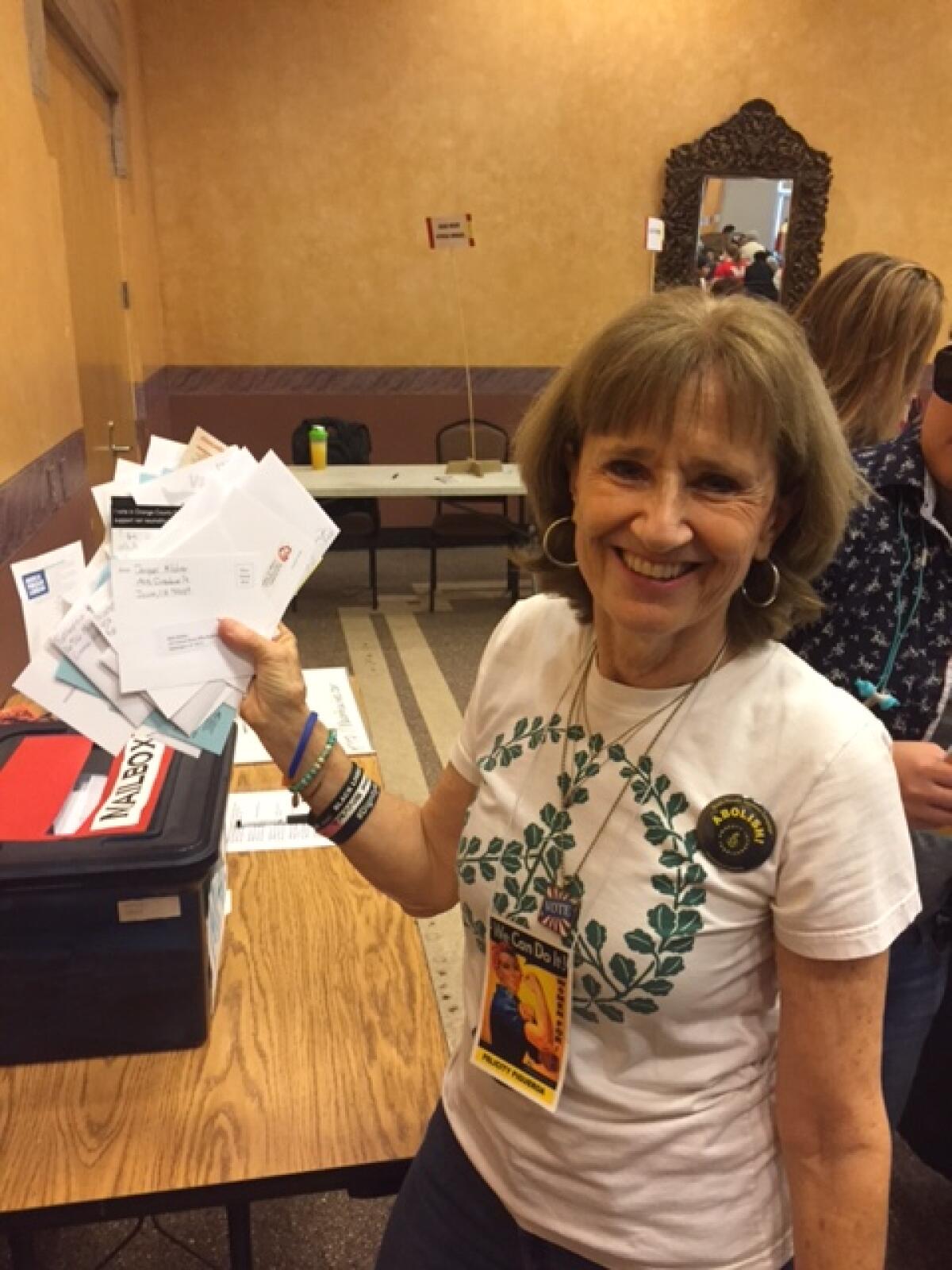Pen mightier than the tweet at Great American Write-In

- Share via
Santa Ana — When it comes to holding government officials accountable, it may seem like the tweet is mightier than the sword. Andrew T. Tonkovich, founding editor of Citric Acid: An Online Orange County Literary Arts Quarterly, disagrees.
“There is that famous quote that is actually misattributed to Edmund Burke; he is supposed to have said something like evil prevails when good people do nothing,” said Tonkovich. “My thing has been evil prevails when people pretend they are doing something online or on their cellphone or on Facebook.”
As a tool for sharing and connecting, social media has its moments, but changing minds and making a real impact can be trickier than reaching out with an @ symbol. Tonkovich isn’t alone in his belief that creating a catalyst for change is better left to pen and paper.
“From what we understand, legislators and their staff do pay more attention to an actual piece of mail that they get,” said Great American Write-In chair Felicity Figueroa.
On May 6, Women For: Orange County will sponsor the Great American Write-In at the Delhi Center on 505 E. Central Ave. in Santa Ana from 9:30 a.m. to 1:30 p.m., the first in-person event since 2019.
“Everyone is welcome,” Figueroa said.
The annual event invites members of the community to gather to influence policy decisions by penning letters to their legislators. The event provides stationery, blank postcards, pens and postage, but Figueroa recommends participants bring their own return address labels to save time. Women For: Orange County also provides coffee and donuts in the morning and a pizza lunch in the afternoon. Preprinted addresses for state senators, O.C. assembly members and the president will also be available.
“If they are going to city council, we will have rosters there with addresses, and people can address them themselves,” said Figueroa.
Tonkovich has participated in the Great American Write-In for many years, and his latest issue of Citric Acid celebrates the relaunch of the event.
“I am so looking forward to this,” said Tonkovich. “It is a beautiful experience and it is so purposeful.”
Women For: Orange County is a grassroots membership organization advocating for women’s issues in Orange County, including human and civil rights, education, healthcare and the environment. The early-spring “letter-writing jamboree” has become an Orange County tradition.
The event features local advocacy groups and organizations with values that align with those of Women For: Orange County.
“We ask them to bring information about their organization, their mission, maybe sign-up sheets for people who might be interested,” Figueroa said. “But the most important thing is either prewritten or sample letters and/or postcards on issues that are important to them so that attendees that come can pick up the letters of the ones that they agree with.”

Figueroa said most of the organizations have letters regarding particular pieces of legislation.
“There are so many bills in every committee,” said Figueroa. “So this is the time to make your wishes known as far as which bills you think should pass.”
Other letters cover more general issues.
“Letters asking for more funding for the unhoused, for example, aren’t responding to a specific bill but are asking for these services from either city government, county government or statewide.”
Roughly 60 organizations will be at this year’s event, and Figueroa assures none of them will be anti-choice, racist or sexist.
The Great American Write-In began in 1986 with about 40 organizations participating, first at the University Club at UC Irvine before moving to the Lake View Senior Center.
“We’ve grown since then,” Figueroa said.
In 2019, the last time the event was held in person before the pandemic, more than 550 participants sent out over 4,250 pieces of mail. Participating organizations this year include the Climate Reality Project - O.C. Chapter, Habitat for Humanity of Orange County, LGBTQ Center O.C., National Coalition of 100 Black Women Inc. O.C. Chapter, Newport Beach Women’s Democratic Club, Veterans for Peace Chapter 110 and more.
“When I took it over in 2012, I wanted the event to be more accessible to all of the county, not just the Irvine and south county area,” said Figueroa. “That was when we moved it to the Delhi Center.”
Figueroa has also worked to bring young students to the event by doing outreach to local civics, social studies and history teachers.
“It was kind of an older crowd that was going and we wanted high school students and college students to understand that they could make a difference too and get them used to the idea of civic participation, as a privilege and a right.”
Tonkovich, an author and retired UC Irvine department of English lecturer, said the Write-In is a chance for anyone to participate in a form of protest that isn’t easy for elected officials to ignore.
“In the mail they get dozens and dozens of real letters, which state and county and federal officials are if not by mandate then by tradition required to respond to,” he said.
Figueroa said a letter can have a greater chance of landing on an official’s desk and recalls a former U.S. representative and longtime supporter of the Write-In, Loretta Sanchez, saying as much.
“One time we gave her a few minutes to speak and she underlined how important is was for legislators to get these handwritten letters with personal stories,” said Figueroa. “When the staff that goes through them gets personal letters that are moving, I think they actually do pass them up the chain of command to the legislators themselves.”
Of course, the impact can be even greater if legislators and their staff don’t just receive one letter about an issue, but many.
“We are generating over 4,000 pieces of mail, and that makes an effect. Whereas if it is just we got 500 checks on this issue and we got 400 checks against, it is not quite the same. It is not emotionally the same,” said Figueroa.
In other words, don’t @ your legislators.
All the latest on Orange County from Orange County.
Get our free TimesOC newsletter.
You may occasionally receive promotional content from the Daily Pilot.




